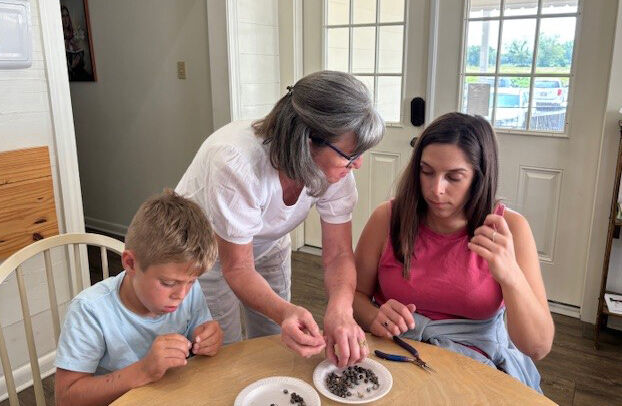Years ago, Holy Rosary Catholic Church members Murphy and Jeanette Gautreau began their own spiritual ministry by creating rosaries from Job’s tears seeds.
Carrying on her parents’ tradition, Kathy Robinson, of St. Amant, has found joy while crafting sacred gray and brown-seeded rosaries.

The Job's tears plant grows in the yard of Kathy Robinson. The seeds are used to make rosaries.
The seeds grow from a tropical plant called Coix lacryma-jobi. The better-known name, Job’s tears, has a porcelain teardrop-shaped appearance. The hard-shell seeds are often used for rosaries, necklaces and other jewelry.
The religious meaning behind Job’s tears, according to Catholic stories, is Job wept tears during the challenges he faced in life. The Coix lacryma-jobi seeds on a rosary represent his tears.

Sonya Hernandez and Donna Leblanc watch closely as Kathy Robinson shows them how to cut the wire to make a rosary.
Robinson’s parents began crafting rosaries years ago to help her father regain use of his hands after a stroke.
“My parents started making rosaries as therapy for my dad while watching television,” Robinson said. “They would clip the Job’s tears seeds, (and) push pins through the hole to make room for the chain.”

Kathy Robinson makes rosaries using Job's Tears beads.
Long believed to have anti-inflammatory and medicinal value, Job’s tears seeds are used in teas, cereals and soups.
“Making the rosaries is very labor intensive,” Robinson said. “You have to first grow the seeds, then cut the seeds, push pins through the seed holes, cut the chain and then start all over again.”
Robinson’s father, who passed away in 2022 from heart issues at the age of 90, made around 7,000 rosaries.

Kathy Robinson, left, shows Denise Dahlgreen and her 14-year-old daughter, Carolyn, the tricky step of cutting the wire to make a rosary using Job's tears seeds.
“He bought the supplies, grew the seeds and made each one himself,” Robinson said.
Meanwhile, Jeanette Gautreau would pass along rosaries at various places such as restaurants and doctors’ offices.
“If my mother saw someone making a sign of the cross at a restaurant, she’d walk over and hand them a rosary,” Robinson said.
A rosary ministry soon became a tradition for the family until Jeanette Gautreau passed away in 2007 from breast cancer.
Murphy Gautreau later expanded the ministry by making rosaries for the Holy Rosary Catholic Church retreats. He also mailed his homemade rosaries to missionaries in India, Canada and Mexico, Robinson said.
Robinson carried on her father’s rosary ministry shortly after he stopped in 2016. She has made around 700 rosaries herself.
The church parish later asked Robinson to create smaller rosaries, known as decade rosaries, which included the St. Christopher medals for confirmation candidates.
Robinson, who grows most of her own Job’s tears seeds, said some years are not as prosperous.
“Last year, I lost my entire crop during the drought,” Robinson said. “I had to order seeds from Etsy.”
Once the seeds have been pulled from Robinson’s yard, one rosary takes around 45 minutes to make, Robinson said.
“This whole process comes from the ground,” Robinson said. “We plant with love, and God sees to it that the seeds grow and that there’s love and sunshine. People see the rosaries and know the seeds are from the Earth and God.”
Robinson recently taught a class of 15 people at Holy Rosary Church how to make rosaries from the Job’s tears seeds.
She hopes to expand the rosary ministry by offering more classes, as well as passing the tradition to her children and grandchildren.
“I’m honored to carry on the ministry because I know what the rosaries meant to my parents,” Robinson said. “Hopefully, they are proud of me.”
“One of my friends said the rosary is an umbilical cord to healing. I love that and hope the rosaries are an inspiration to others about what’s important in life and help gets them closer to God.”







